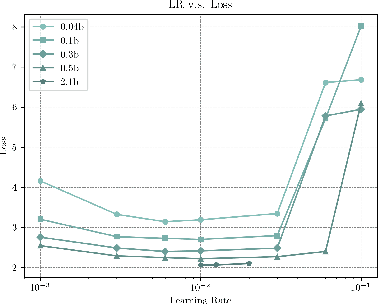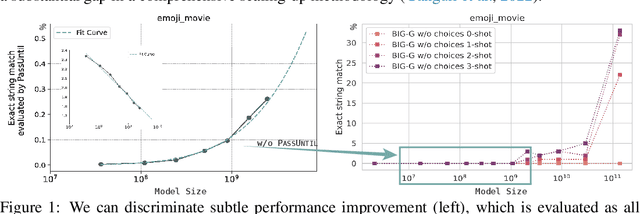Chaoqun He
LLM$\times$MapReduce-V2: Entropy-Driven Convolutional Test-Time Scaling for Generating Long-Form Articles from Extremely Long Resources
Apr 08, 2025Abstract:Long-form generation is crucial for a wide range of practical applications, typically categorized into short-to-long and long-to-long generation. While short-to-long generations have received considerable attention, generating long texts from extremely long resources remains relatively underexplored. The primary challenge in long-to-long generation lies in effectively integrating and analyzing relevant information from extensive inputs, which remains difficult for current large language models (LLMs). In this paper, we propose LLM$\times$MapReduce-V2, a novel test-time scaling strategy designed to enhance the ability of LLMs to process extremely long inputs. Drawing inspiration from convolutional neural networks, which iteratively integrate local features into higher-level global representations, LLM$\times$MapReduce-V2 utilizes stacked convolutional scaling layers to progressively expand the understanding of input materials. Both quantitative and qualitative experimental results demonstrate that our approach substantially enhances the ability of LLMs to process long inputs and generate coherent, informative long-form articles, outperforming several representative baselines.
UltraEval: A Lightweight Platform for Flexible and Comprehensive Evaluation for LLMs
Apr 11, 2024



Abstract:Evaluation is pivotal for honing Large Language Models (LLMs), pinpointing their capabilities and guiding enhancements. The rapid development of LLMs calls for a lightweight and easy-to-use framework for swift evaluation deployment. However, due to the various implementation details to consider, developing a comprehensive evaluation platform is never easy. Existing platforms are often complex and poorly modularized, hindering seamless incorporation into researcher's workflows. This paper introduces UltraEval, a user-friendly evaluation framework characterized by lightweight, comprehensiveness, modularity, and efficiency. We identify and reimplement three core components of model evaluation (models, data, and metrics). The resulting composability allows for the free combination of different models, tasks, prompts, and metrics within a unified evaluation workflow. Additionally, UltraEval supports diverse models owing to a unified HTTP service and provides sufficient inference acceleration. UltraEval is now available for researchers publicly~\footnote{Website is at \url{https://github.com/OpenBMB/UltraEval}}.
MiniCPM: Unveiling the Potential of Small Language Models with Scalable Training Strategies
Apr 09, 2024



Abstract:The burgeoning interest in developing Large Language Models (LLMs) with up to trillion parameters has been met with concerns regarding resource efficiency and practical expense, particularly given the immense cost of experimentation. This scenario underscores the importance of exploring the potential of Small Language Models (SLMs) as a resource-efficient alternative. In this context, we introduce MiniCPM, specifically the 1.2B and 2.4B non-embedding parameter variants, not only excel in their respective categories but also demonstrate capabilities on par with 7B-13B LLMs. While focusing on SLMs, our approach exhibits scalability in both model and data dimensions for future LLM research. Regarding model scaling, we employ extensive model wind tunnel experiments for stable and optimal scaling. For data scaling, we introduce a Warmup-Stable-Decay (WSD) learning rate scheduler (LRS), conducive to continuous training and domain adaptation. We present an in-depth analysis of the intriguing training dynamics that occurred in the WSD LRS. With WSD LRS, we are now able to efficiently study data-model scaling law without extensive retraining experiments on both axes of model and data, from which we derive the much higher compute optimal data-model ratio than Chinchilla Optimal. Additionally, we introduce MiniCPM family, including MiniCPM-DPO, MiniCPM-MoE and MiniCPM-128K, whose excellent performance further cementing MiniCPM's foundation in diverse SLM applications. MiniCPM models are available publicly at https://github.com/OpenBMB/MiniCPM .
OlympiadBench: A Challenging Benchmark for Promoting AGI with Olympiad-Level Bilingual Multimodal Scientific Problems
Feb 21, 2024



Abstract:Recent advancements have seen Large Language Models (LLMs) and Large Multimodal Models (LMMs) surpassing general human capabilities in various tasks, approaching the proficiency level of human experts across multiple domains. With traditional benchmarks becoming less challenging for these models, new rigorous challenges are essential to gauge their advanced abilities. In this work, we present OlympiadBench, an Olympiad-level bilingual multimodal scientific benchmark, featuring 8,952 problems from Olympiad-level mathematics and physics competitions, including the Chinese college entrance exam. Each problem is detailed with expert-level annotations for step-by-step reasoning. Evaluating top-tier models on OlympiadBench, we implement a comprehensive assessment methodology to accurately evaluate model responses. Notably, the best-performing model, GPT-4V, attains an average score of 17.23% on OlympiadBench, with a mere 11.28% in physics, highlighting the benchmark rigor and the intricacy of physical reasoning. Our analysis orienting GPT-4V points out prevalent issues with hallucinations, knowledge omissions, and logical fallacies. We hope that our challenging benchmark can serve as a valuable resource for helping future AGI research endeavors.
Unlock Predictable Scaling from Emergent Abilities
Oct 05, 2023



Abstract:The scientific scale-up of large language models (LLMs) necessitates a comprehensive understanding of their scaling properties. However, the existing literature on the scaling properties only yields an incomplete answer: optimization loss decreases predictably as the model size increases, in line with established scaling law; yet no scaling law for task has been established and the task performances are far from predictable during scaling. Task performances typically show minor gains on small models until they improve dramatically once models exceed a size threshold, exemplifying the ``emergent abilities''. In this study, we discover that small models, although they exhibit minor performance, demonstrate critical and consistent task performance improvements that are not captured by conventional evaluation strategies due to insufficient measurement resolution. To measure such improvements, we introduce PassUntil, an evaluation strategy through massive sampling in the decoding phase. We conduct quantitative investigations into the scaling law of task performance. Firstly, a strict task scaling law is identified, enhancing the predictability of task performances. Remarkably, we are able to predict the performance of the 2.4B model on code generation with merely 0.05\% deviation before training starts. Secondly, underpinned by PassUntil, we observe concrete evidence of emergent abilities and ascertain that they are not in conflict with the continuity of performance improvement. Their semblance to break-through is that their scaling curve cannot be fitted by standard scaling law function. We then introduce a mathematical definition for the emergent abilities. Through the definition, we refute a prevalent ``multi-step reasoning hypothesis'' regarding the genesis of emergent abilities and propose a new hypothesis with a satisfying fit to the observed scaling curve.
 Add to Chrome
Add to Chrome Add to Firefox
Add to Firefox Add to Edge
Add to Edge